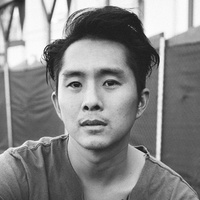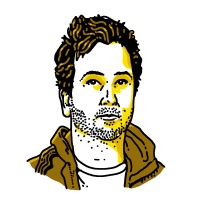On defying convention, working conceptually, and knowing when to move on
Prelude
The electronic musician Nicola Cruz ’s self-described “Andes step” sound invokes the landscapes and rituals of his homeland in Ecuador. His creative process involves an attentive, careful search for the living roots and rituals that are part of South American identity—its Andean and African origins in particular—valuing its rhythms, its oral traditions, its instruments, and the energy they transmit. His first record, Prender el Alma (2015), explored the development of consciousness and spirituality, and how they connect with music. In Siku, his most recent production, Cruz continues this exploration, expanding his vision towards new stories and other cultures as sources of inspiration. A crucial aspect of this journey is his collaboration with other artists from around the world.
Conversation
On defying convention, working conceptually, and knowing when to move on
Ecuadorian electronic musician Nicola Cruz on giving yourself time to properly develop a concept, the telekenesis involved with deep collaborations, and knowing when it’s time to move on to something new.
As told to Miriam Garcia, 1761 words.
Tags: Music, Inspiration, Process, Creative anxiety, Production, Identity.
You started making music when you were 12 years old. Did you know by then that you wanted to be an artist, or were you just exploring and being curious?
It’s not like you choose to be someone, right? In my case it just developed in me. My starting point with my involvement in music was when my parents bought me a drum set when I was 12 years old. I am really lucky for that. One thing led to another and, after high school, I decided to study sound engineering. Then music production led me to make the type of music I make today.
You live in Ecuador. I imagine that life there is full of rich sounds that end up in your music. What elements of your daily life inspire you to create?
What you go through daily helps you discover and interpret life—the questions you ask yourself, my curiosity as a musician and my surroundings, my life in Ecuador, and what I see when I travel around the world. I’m really into different world instrumentations and colors from other cultures, the way different towns make and interpret the same things we have here in Ecuador, in terms of cultural movements. I find that really intriguing.
When you are working on new material, do you do any kind of research about the new instruments, sounds, and oral traditions that end up in your work?
I do believe it’s really important to know what you’re talking about. For example, if you are going to talk about certain Andean traditions, it’s important that you know about it; that you experience it before you just vaguely talk or say something about it. My album Siku has lots of research behind it. Two years of really listening to sounds of music, traveling a lot around the world, getting to know all of the concepts that I wanted to put into the album.
On your most recent album you collaborated with different musicians from around the world. What do you usually look for in your collaborators?
Specifically, I look for a good connection. More than a connection musically, it’s kind of like telekinesis. The people that I met during this process have been people that I felt deeply connected to in terms of the music they play. I’ve become a big admirer of their work. That’s one of the things that tells me to collaborate with people. It’s so easy to record with any musician, but it’s not about that. It’s really about putting these ideas and thoughts into the music or songs you’re going to make. We really took our time to get to know each other through the music beforehand.
When you are creating something, it is important to find a balance between daydreaming, being open to exploring new ideas, or taking the time to let your projects grow and develop. But you also need the discipline to set schedules, establish routines, and set aside time to land those ideas and transform them into music. Is this balance something that you think about, or do you see the whole process as one thing?
For me working and being creative is the same thing. The balance comes when I’m working in the studio, finding locations, traveling, and touring. The process of making Siku took me about two years, and I recorded it in many different locations. I might have done 20 recordings, then I narrowed it down to 11 songs. All of them ended up on the album. During that process I was playing and touring around different cities. I mainly did checkpoints, where I got into the studio for a few months and eventually got to a point where I could give my ears a break for another two months before I came back to the studio.
By doing this, I was able to have a clearer perception about what I was doing and what I wanted to change—of course, during that time the concept of Siku was still developing within me. That’s the magical part about creating a concept, whatever it is. It could be music or a photography project, anything! It is something that develops inside. You have an idea in your head that you want to develop. You will get there eventually, but it might take a week, it could take two years, it could take five years. You do whatever it takes.
Do you try to keep a routine when you are traveling? What helps you to stay calm and keep things in order?
I try to exercise every day. Being on tour can make you feel a bit claustrophobic. When I’m in Ecuador I like to take trips on the weekends to refresh my mind. That helps a lot when I come back to work on music. It could be like a really, really immersive process, especially if you are working on something for two years. It can get tiring.
One of your songs was recorded inside an inactive volcano. What were you attempting by doing this kind of recording?
That’s the thing about electronic music, you can be as experimental as you want. I tried to make my sounds as expressive as possible. I love these things. I love to experiment with different spaces where you not only get an interesting sound, but it also puts you in a mood. The ritual was taking all the steps to go somewhere, which is not necessarily a conventional place for recording and then trying stuff there. The song you are referring to is “Arka,” it turned out to be very interesting.
Do you think there are any certain stereotypes or expectations of what a South American artist should sound like? Your music has a lot of global influences, not only from the Andes. Do you ever feel like your work is categorized into Andean music exclusively?
To be honest, I don’t like to be categorized. For example, Prender El Alma was an album that was categorized as South American for a long time, but Siku has two songs inspired under that bridge while the rest of the album can be classified as global. I really don’t care that much about the categories, although people like to get married to the tags and stuff. Outside of South America they love to call everything Cumbia even when it’s not. That’s completely wrong. Anyway, what can you do?
For you, what are the necessary elements of a concept album?
Developing a strong concept takes time. I believe that interesting art usually has a solid concept behind it, not something redundant or too literal. It’s an idea that develops in you, but it takes a while and there are tons of questions to be answered. It’s also beautiful how these answers are revealed in the most unexpected ways. And then one day, you have it.
There are so many ways to release music. It can be a single, an EP, an album. Is there any format that you prefer? Do you think of the format for the final project or do you just focus on what you create as it goes?
I like all the different formats. Sometimes it’s just one song and it can be a single, or you can work on an EP, and then an LP. You can tell different types of stories maybe with an EP. A whole album takes longer, it takes more time to grow and develop inside of you. It develops into a stronger concept.
How do you know when an album is finished? Do you look for a certain kind of coherence or narrative?
I have never struggled with that. You just feel it. It’s not a formula. Eventually you arrive at a place where it’s circular, or you just think, “Alright, this song feels good as the last song.” I’ve always felt that way when I finish a song. I have no problem saying, “Alright, it is time to move on.”
It must be quite liberating to know when an album is done, to be able to let go. But what happens after that? Do you feel an urgency to start creating something else immediately, or do you usually like to take breaks or focus on something else that is not necessarily related to music?
Usually an album is done months before it comes out, so by that time I’m already working on new projects. Composing is a habit for me; I can’t stop doing it. My urge to experiment is always there. I’ve learned not to rush and let my mind and my music breathe, and to step back and enjoy it. That’s where going to the beach, making field recordings, and taking pictures comes in. Documenting stuff doesn’t feel like it has a purpose for me; it’s just a way of letting go.
For the kind of work that you do, what do you think are the most valuable resources?
Having a clear idea in your head of what you want. That really goes first, before anything, before the music, before the structure.
Do you ever feel creatively anxious? Do you ever have doubts about your work, your music, and what you’re creating?
I have the usual anxieties, but nothing too crazy. A normal amount for a human being. I know how to move on. I don’t get stuck.
As far as your creative work is concerned, how do you define success? How do you define failure?
I don’t see life in black and white; there are many levels where you could have succeeded, and many where you could have failed. More than that, it’s important to see what you’ve learned, and to have resilience.
You have a fair amount of followers on Instagram. What’s your relationship with social media and other online spaces?
To be honest, I hate them. I try to post as little as possible. It has taken up a good percentage of my human interaction and daily life reality. I’m in the process of stepping out of it. It is useful to communicate with your audience, of course. To tell people where you are playing, if you’ve released a new song or project, but something weird comes with it. I don’t believe in it. I’m aiming the other way.
Nicola Cruz Recommends:
Swimming at the beach
Getting lost in the city
Composing music
Taking pictures
Diving
- Name
- Nicola Cruz
- Vocation
- Musician
Some Things
Pagination



